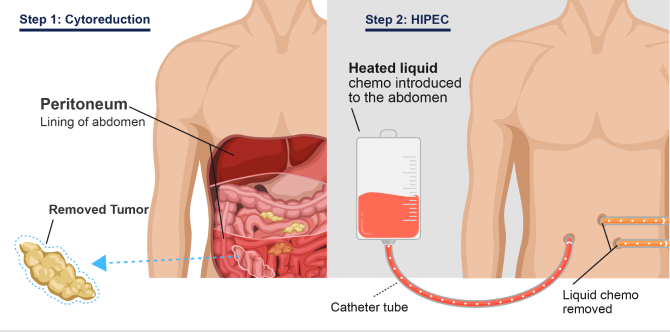What Is Peritoneal Mesothelioma?
Malignant peritoneal mesothelioma is a type of cancer that develops in the peritoneum, the thin membrane that covers the abdominal cavity.
It’s the second most common type of mesothelioma and makes up 10-15% of all cases. The most common type is pleural mesothelioma, which affects the lining of the lungs (pleura).
Peritoneal mesothelioma can spread to other parts of the body, including nearby organs like the liver and intestines.

Patients with abdominal mesothelioma cancer usually notice a range of subtle, non-specific symptoms at first, like appetite loss and nausea. As the disease spreads, stomach pain, constipation, and other warning signs of this cancer become more noticeable.
Download our Free Peritoneal Mesothelioma Guide to learn more about this cancer and the latest treatments that are helping patients live longer.
Peritoneal Mesothelioma Causes
Asbestos exposure is the only known cause of peritoneal mesothelioma. When asbestos fibers are breathed in or swallowed, they can harm normal, healthy tissue over time.
This is how asbestos causes mesothelioma in the peritoneum:
- Exposure: The patient inhales or swallows microscopic asbestos fibers.
- Buildup: These fibers become trapped in the tissue of the abdominal lining and begin to irritate healthy cells.
- Damage: Cell DNA mutations cause cancerous mesothelial cells to grow. The peritoneum begins to thicken, and fluid starts to build up in the abdominal cavity.
- Cancer: Mesothelial cells grow and spread, eventually causing cancerous tumors to form in the peritoneum.

Peritoneal mesothelioma is the second-most common type of this cancer and forms in the abdominal lining 10-50 years after exposure. Surgery and heated chemotherapy can help many patients live longer. View Transcript.
Duration: 1 min 28 sec
Malignant peritoneal mesothelioma is a rare and aggressive cancer that develops in the lining of the abdomen also known as the parium. It is strongly associated with exposure to asbestos. What are the symptoms of this rare cancer watch out for belly pain, persistent bloating, and the accumulation of fluid in the abdomen. These are all signs that can indicate the presence of malignant peritoneal mesothelioma. Over the years, advancements in medical research and treatment options have offered new possibilities. In particular, a specific procedure that involves tumor debulking surgery followed by heated chemotherapy, has shown to extend survival time and improve quality of life for many
patients. Malignant peritoneal mesothelioma is often challenging to treat and the prognosis is usually 6 months to 1 year without treatment. However, there is hope, some patients have defied the odds to becoming long-term survivors living for more than 15 years with the help of
Specialists. Emerging treatment such as immunotherapy and gene therapy are also showing promise for peritoneal mesothelioma patients in clinical trials. If you or someone you know is facing malignant peritoneal mesothelioma, remember that you’re not alone. Mesothelioma Hope offers free resources to support your family during this difficult time. Contact our team today to learn more about your diagnosis. Connect with top doctors and explore options that can help you pay for treatment.
Mesothelioma Peritoneal Cancer Symptoms
Peritoneal mesothelioma symptoms may not appear until 10-50 years after a person was first exposed to asbestos.
Common symptoms of peritoneal mesothelioma include:
- Abdominal fluid buildup (peritoneal ascites)
- Abdominal (belly) pain
- Bloating (abdominal distention)
- Constipation or bowel blockage (obstruction)
- Fever or night sweats
- Loss of appetite
- Nausea and vomiting
- Unexplained weight loss


“It got to the point where if I sat, I couldn’t stand up straight. It was like my insides were glued.”
If you think you may have been exposed to asbestos and are experiencing mesothelioma stomach pains or any of these other symptoms, contact a doctor as quickly as possible.
The sooner you get a diagnosis, the faster you can start treatment to manage your cancer. Get in touch with our team for help finding a doctor who can guide your treatment plan.
Getting a Peritoneal Mesothelioma Diagnosis
Malignant peritoneal mesothelioma is diagnosed through a series of tests. Common mesothelioma diagnosis methods include:
- Physical exams
- Imaging scans
- Blood tests
- Biopsies
A computed tomography (CT) scan is often the first imaging test used to diagnose mesothelioma of the abdomen. Many mesothelioma doctors will order CT scans to check for abnormalities when a patient has stomach issues.


“Peritoneal mesothelioma is a serious disease, but if it’s caught early and treated aggressively, there can be positive outcomes.”
However, a biopsy is the only way to confirm a peritoneal mesothelioma diagnosis. This involves examining a tissue or fluid sample under a microscope to see if it contains cancer cells.
Contact our Patient Advocates for help getting an accurate diagnosis or second opinion. They can recommend local peritoneal mesothelioma specialists and assist in scheduling your first appointment.
Peritoneal Mesothelioma Staging
Mesothelioma staging refers to how far the cancer has spread from where it initially formed.
Peritoneal mesothelioma stages aren’t based on a formal staging system like pleural mesothelioma uses. However, doctors can potentially use the peritoneal cancer index (PCI) to analyze the spread.
The PCI divides the abdomen into 13 sections, giving each section a score of 0-3. Zero means there is no cancer, while 3 indicates cancer is present.
The 4 PCI Stages
- Stage 1: PCI score of 1-10
- Stage 2: PCI score of 11-20
- Stage 3: PCI score of 21-30
- Stage 4: PCI score of 31-39
PCI scores provide a standard for oncologists (cancer doctors) to measure the extent of the cancer and tailor treatment plans to each patient.
Peritoneal Mesothelioma Cell Types
In addition to a stage of cancer, your mesothelioma diagnosis should also include your cell type.
There are three main mesothelioma cell types:
- Epithelioid peritoneal mesothelioma is the most common cell type and the most responsive to treatment.
- Sarcomatoid peritoneal mesothelioma cells are much rarer and can be more challenging to treat.
- Biphasic peritoneal mesothelioma includes both epithelioid and sarcomatoid cell types.
Your doctor can help you determine the best course of treatment based on your peritoneal mesothelioma cell type.
Use our Free Doctor Match service for help connecting with experienced mesothelioma specialists.
Peritoneal Mesothelioma Prognosis
The average peritoneal mesothelioma prognosis is 53 months after surgery with heated chemotherapy.
Doctors use the word “prognosis” to describe the estimated outcome for patients with malignant peritoneal mesothelioma. It’s based on median survival times researchers have seen over the years in patients diagnosed with this cancer.
If you’ve been diagnosed with peritoneal mesothelioma, your prognosis will depend on several factors, such as your age, overall health, and cancer stage.
Peritoneal Mesothelioma Survival Rate and Life Expectancy
There are two ways to measure peritoneal mesothelioma prognosis:
- Survival rate is the percentage of patients who are still alive at a certain time after diagnosis.
- Life expectancy is the average length of time patients live after a diagnosis.
The chart below provides the 1-, 3-, and 5-year survival rates for peritoneal mesothelioma.
| Time After Diagnosis | Survival Rate |
|---|---|
| 1 year | 92% |
| 3 years | 74% |
| 5 years | 65% |
| 10 years | 39% |
These numbers are just averages and don’t reflect every patient’s individual experience. There are malignant peritoneal mesothelioma survivors who’ve lived 15 years or more, becoming symbols of hope and resilience for others battling this cancer.
Peritoneal Mesothelioma Survivor Stories
Many people diagnosed with mesothelioma of the abdomen have outlived their prognosis and are still thriving today. Below are some of their stories.
- Alexis Kidd was diagnosed in 2007 following a gallbladder surgery, during which her doctor noticed something off and took a tissue sample from her diaphragm. Alexis underwent surgery and chemotherapy and is still living life with her husband over 18 years later.
- Jessica Blackford-Cleeton was diagnosed in 2015 after over a year of her symptoms being dismissed and ignored. Jessica had to advocate for an accurate diagnosis and fight to ensure her treatments wouldn’t affect her ability to have children. Today, Jessica and her husband have two sons and are navigating parenthood amid mesothelioma survivorship.
- Julie Gundlach was given 6-12 months to live after her diagnosis in 2006. Nearly 20 years later, Julie is a staunch opponent of the asbestos industry, using her voice to expose its dangers and ensure victims get justice. She takes life one day at a time, grateful for the big and small moments with her family.


“That is, without a doubt, a miracle. Getting to see a life that I never thought I’d see.”
Read stories from other patients like Alexis, Jessica, and Julie in our Free Mesothelioma Survivors Guide. Find inspiration on navigating your peritoneal mesothelioma journey and getting the treatment and support you deserve.
Treatment for Malignant Peritoneal Mesothelioma
Doctors can treat peritoneal mesothelioma in a variety of different ways, from performing surgery to prescribing chemotherapy and immunotherapy infusions.
Learn more about the top treatment options for malignant peritoneal mesothelioma below.
Cytoreduction With HIPEC
The gold standard treatment for peritoneal mesothelioma is cytoreduction with HIPEC (hyperthermic intraperitoneal chemotherapy). HIPEC is also referred to as heated chemotherapy.
Cytoreductive surgery with HIPEC involves:
- Surgically removing visible tumors from the abdomen
- Applying a heated chemotherapy solution directly to the abdominal cavity to kill remaining cancer cells


Administering heated chemotherapy during surgery allows for a higher concentration of the drugs to reach the cancer with fewer side effects than standard chemotherapy.
The entire procedure takes between 8-12 hours. Most patients stay in the intensive care unit for 1-2 days to recover.
Chemotherapy
Chemotherapy is used to shrink abdominal tumors and kill cancerous cells. Patients who can’t undergo cytoreduction with HIPEC often receive systemic chemotherapy (which travels throughout the body).
The chemotherapy drug Alimta® (pemetrexed) administered alone or combined with another type of chemotherapy called cisplatin gives peritoneal mesothelioma patients the best chance of long-term survival and remission. Mesothelioma remission is when no cancer is detectable in the body.
One woman with advanced peritoneal mesothelioma achieved full remission after chemotherapy and immunotherapy, according to a 2023 study published in BMJ Case Reports. She received 18 rounds of chemotherapy with pemetrexed and the immunotherapy drug bevacizumab (Avastin®) over a year.
Immunotherapy
Immunotherapy helps the immune system find and attack cancer cells. The role of immunotherapy in peritoneal mesothelioma treatment is evolving as doctors learn from its success in treating pleural mesothelioma.
Clinical trials have shown that combining the two immunotherapy drugs Opdivo® (nivolumab) and Yervoy® (ipilimumab) helps pleural mesothelioma patients live longer than chemotherapy.
Keytruda® (pembrolizumab) is another immunotherapy drug that could one day become a standard peritoneal mesothelioma treatment. Additionally, some doctors may use it off-label as a second-line therapy if patients don’t respond to standard treatments.
A study in the March 2023 edition of Oncology reported on 24 peritoneal mesothelioma patients treated with Keytruda. Five of the patients had their tumors shrink, and more than half had their cancer stabilize (meaning their tumors didn’t grow or shrink).
Learn more about which peritoneal mesothelioma treatment options may be right for you in our Free Peritoneal Mesothelioma Guide.
Palliative Care to Manage Symptoms
Peritoneal mesothelioma patients can receive pain medications and other types of palliative care at any time during treatment to manage symptoms and improve their quality of life.
Another palliative care option is paracentesis, a minor surgical procedure that drains painful fluid buildup from the abdominal cavity. This can alleviate symptoms like belly pain, bloating, nausea, and fatigue.
Clinical Trials and Emerging Therapies
Clinical trials offer peritoneal mesothelioma patients access to cutting-edge treatments that are not widely available to the public.
Participating in a clinical trial also provides an opportunity to benefit from the latest advancements in cancer therapy at no cost.
Various emerging treatments are being studied for peritoneal mesothelioma:
- Gene therapy involves modifying a mesothelioma patient’s genes to fight cancer. Scientists are exploring ways to correct mutations in tumor suppressor genes and introduce new genes to improve the body’s ability to attack mesothelioma.
- Targeted therapy focuses on specific genetic mutations or proteins that drive cancer growth. It is designed to attack cancer cells without harming healthy tissue, which means the side effects are usually less severe than with chemotherapy.
- Vaccines can stimulate the immune system to recognize and attack mesothelioma cells. These vaccines are designed to boost the body’s natural defenses against cancer.
Contact us today to get help finding active peritoneal mesothelioma clinical trials where you live.
Peritoneal Mesothelioma Doctors
One of the best ways to improve your prognosis is to see a peritoneal mesothelioma doctor for treatment. These specialists have decades of experience helping patients live longer, fuller lives.
A few of the country’s top peritoneal mesothelioma specialists are highlighted below. Use our Free Doctor Match service to get help connecting with a specialist near you.


Dr. James Pingpank
15+ years of experienceSurgical Oncologist at the University of Pittsburgh Medical Center in Pittsburgh, PA, and Associate Professor of Surgery for the University’s School of Medicine


Dr. Hedy Lee Kindler
25+ years of experienceDirector of the Mesothelioma Program and Medical Director of Gastrointestinal Oncology at the University of Chicago Comprehensive Cancer Center


Dr. Richard Alexander
25+ years of experienceChief Surgical Officer at Rutgers Cancer Institute in New Brunswick, NJ, and System Director of Surgical Oncology at RWJBarnabas Health in West Orange, NJ


Dr. Mecker Möller
15+ years of experienceLeads the Regional Therapies (HIPEC) Program at the University of Chicago Comprehensive Cancer Center
Compensation for Peritoneal Mesothelioma Cancer
A malignant peritoneal mesothelioma diagnosis can be expensive, and many families aren’t financially prepared to shoulder all the costs that come with testing and treatment.
But money should never be a barrier to getting the support you deserve. Mesothelioma compensation can help you pay for treatment, travel, and out-of-pocket expenses. Learn more about your options below.
Mesothelioma Lawsuits
Filing a lawsuit allows you to seek justice for yourself or a loved one who developed peritoneal mesothelioma cancer after exposure to asbestos products.
Nearly all mesothelioma lawsuits are settled out of court, with an average settlement between $1 million and $1.4 million, allowing you to receive compensation without going to trial.
Some notable peritoneal mesothelioma settlement awards include:
- $11.9 million for a New York real estate investor
- $5.8 million for a Florida man who worked as a mechanic
- $4.3 million for a Missouri electrician
- $3.8 million for a U.S. Navy veteran from Illinois
- $6.4 million for the family of a North Carolina patient
A mesothelioma lawyer can handle every step of the legal process on your behalf while you focus on your health and well-being.
Asbestos Trust Funds
Many asbestos product manufacturers filed for bankruptcy to avoid being sued but were forced to put money into trust funds to pay victims.
Over $30 billion is already set aside and currently available in asbestos trust funds. If you or a loved one has been diagnosed with peritoneal mesothelioma, you may be eligible to access some of this money.
Asbestos victims are usually able to file claims with multiple trusts, with many receiving their first payouts within 90 days.
VA Disability Compensation
Military veterans with peritoneal mesothelioma can file for VA benefits through the U.S. Department of Veterans Affairs (VA).
These benefits include tax-free VA disability payments of over $4,000 per month as well as free or reduced-cost treatment through the VA health care system.
Filing a legal claim doesn’t impact your eligibility for veterans benefits — you can pursue both at the same time.
Get Help for Mesothelioma in the Abdomen Today
If you or your loved one has recently been diagnosed with peritoneal mesothelioma, there’s a lot to consider — and you may not know where to start.
We can help you:
- Understand your diagnosis and pathology report
- Find a specialist for treatment
- Navigate your options for financial compensation
- Connect with a support group or peer mentor
It’s always free to speak with us. Call (866) 608-8933 or fill out our contact form right now.
Peritoneal Mesothelioma Cancer FAQs
What can cause peritoneal mesothelioma?
Asbestos exposure is the primary cause of malignant peritoneal mesothelioma.
When people inhale or swallow asbestos, the fibers can become embedded in stomach tissue and irritate healthy cells.
Over time, the damage can cause cancerous cells to grow in the abdominal lining and spread to nearby organs and tissues.
How do you test for peritoneal mesothelioma?
Testing for peritoneal mesothelioma typically involves these steps:
- Imaging scans: Doctors can use CT scans, MRI, or PET scans to look for abnormalities in the abdomen.
- Blood tests: These may detect certain biomarkers (substances in the blood) that indicate a patient may have mesothelioma.
- Biopsy: A sample of fluid or tissue is taken from the abdomen and examined under a microscope to determine if cancer cells are present.
These tests and procedures help doctors confirm a peritoneal mesothelioma diagnosis and determine if the cancer has spread.
How do you treat abdominal mesothelioma?
Doctors treat abdominal mesothelioma by performing cytoreductive surgery to remove as much of the tumor as possible, often followed by heated intraperitoneal chemotherapy (HIPEC) directly applied to the abdominal cavity.
Chemotherapy can also be used before surgery to shrink tumors or after surgery to kill any remaining cancer cells.
What are the new treatments for peritoneal mesothelioma?
Pegargiminase (ADI-PEG20) is an innovative new drug that starves mesothelioma tumors of the nutrients they need to grow. When combined with chemotherapy, it has improved patient survival times in clinical trials.
Combining immunotherapy drugs like Tecentriq® (atezolizumab) and Avastin® (bevacizumab) has also shown promising results. These drugs help the immune system fight cancer and prevent the growth of new blood vessels that tumors need to survive.
What is the survival rate of peritoneal mesothelioma?
Peritoneal mesothelioma has a 5-year survival rate of 65%, according to Moffitt Cancer Center. This means 65% of patients are still alive 5 years after being diagnosed.
The 5-year survival rate increases to 80% when patients get long-term regional chemotherapy with pemetrexed and cisplatin after cytoreductive surgery.
What is the progression of peritoneal mesothelioma?
Peritoneal mesothelioma typically progresses through these stages:
- Asbestos exposure: Asbestos fibers are breathed in or swallowed and get trapped in the abdominal lining (peritoneum).
- Latency period: Peritoneal mesothelioma has a long latency period, often taking 10-50 years for symptoms to appear after asbestos exposure.
- Early stage: Early symptoms may include abdominal pain, swelling, and digestive issues. At this stage, the cancer is still contained within the peritoneum.
- Advanced stage: As the disease progresses, tumors spread to other organs and tissues within the peritoneum, leading to significant fluid buildup and weight loss.
Understanding the progression of peritoneal mesothelioma is crucial for getting a timely diagnosis and treatment to improve your prognosis and quality of life.
What is the life expectancy of someone with peritoneal mesothelioma?
Peritoneal mesothelioma patients live 53 months on average with cytoreductive surgery and HIPEC. However, some patients — like peritoneal mesothelioma survivor Julie Gundlach — have lived over 15 years after being diagnosed.
Early diagnosis and treatment can significantly improve your life expectancy. If you or someone you know has been diagnosed with peritoneal mesothelioma, make sure to visit a specialist as soon as possible to discuss your treatment options.








